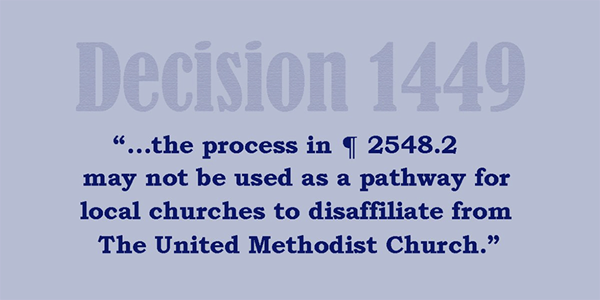As the bishops met in August, The United Methodist Church’s top court issued a landmark ruling that could have implications for lawsuits over church property in U.S. civil courts.
In Decision 1449, the Judicial Council ruled out the Book of Discipline’s Paragraph 2548.2 as a pathway for congregations to disaffiliate. Instead, the church court pointed to another disciplinary provision — Paragraph 2553 — as the way for congregations to leave with both members and property.
Your support of The General Administration Fund apportionment implements trustworthy administrative oversight like the General Conference sessions.
Paragraph 2553 requires departing churches to meet certain procedural and financial obligations — namely paying at least two years of apportionments and a share of their annual conferences’ unfunded clergy pension liability. The church law expires on Dec. 31, 2023.
The version of Paragraph 2553 that General Conference approved was substitute legislation proposed by traditionalists.
However, for the most part, it has been traditionalist churches seeking to exit. And since the launch of the Global Methodist Church in May, many of the new denomination’s backers — including the Wesleyan Covenant Association — have decried Paragraph 2553 as too onerous, especially since it gives annual conferences leeway in setting church exit terms.
The Rev. Jay Therrell, association president, said 19 conferences are “adding even more requirements and financial payments that make it out of reach for most churches.”
He also objects to the funding required by another provision the 2019 General Conference overwhelmingly approved — Paragraph 1504.23, which specifies that “market factors similar to a commercial annuity provider” will be used in determining pension liabilities no matter how a church departs. Therrell said calculating pension obligations on a market basis rather than funded basis leaves annual conferences overfunded.
The Wesleyan Covenant Association and other Global Methodist Church backers have pushed for annual conferences to use Paragraph 2548.2 as an alternative. The disciplinary provision allows an annual conference to direct the local church trustees to deed property to another denomination that already has an existing agreement with The United Methodist Church.
No such agreement exists with the Global Methodist Church. The Judicial Council also ruled that Paragraph 2548.2 only applies to property and not membership.
After the Judicial Council decision’s release, Therrell released a video expressing the association’s disappointment. “If it is at all possible to use 2553, then do so,” he told churches considering disaffiliation. However, he said, churches that find the obligations too burdensome “may have to engage in a legal strategy.”
That is already happening in some corners. In July, 106 churches joined in a civil lawsuit filed against Florida Conference leaders, demanding the conference use Paragraph 2548.2 to transfer the disaffiliating congregations to the Global Methodist Church.
United Methodist chancellors say the Judicial Council ruling could have an impact on civil courts.
Bishop Kenneth Carter, who leads the Florida and Western North Carolina conferences, issued a letter saying the Florida Conference would now seek the dismissal of the ongoing lawsuit based in part on the Judicial Council decision.
excerpt from a story by Heather Hahn, multimedia news reporter, United Methodist News Service
One of seven apportioned giving opportunities of The United Methodist Church, the General Administration Fund implements trustworthy administrative oversight, supports the legislative processes of the church and curates The United Methodist Church’s rich history. Please encourage your leaders and congregations to support the General Administration Fund apportionment at 100 percent.





